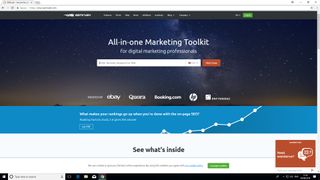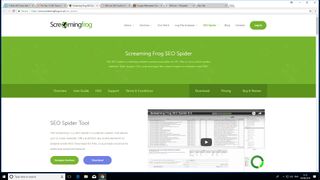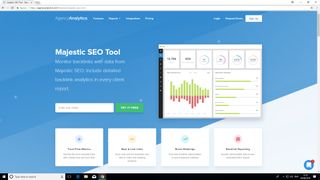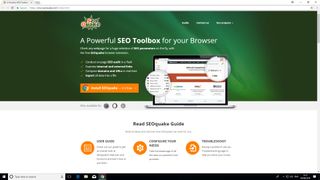SEO (Search Engine Optimization) is a relatively recent branch of web mastery. At its simplest level, it involves guessing likely keywords potential visitors to your site might enter into a search engine, then working out ways to make sure your own pages feature high on the results list. The higher the search ranking, the more likely a user will make that all-important click to visit your site.
This isn’t always easy to do, as your competitors will try to crowd the listings, forcing your sites ranking down in the SERP (Search Engine Results Page). Unscrupulous spammers will also sometimes try to artificially lift their junk pages using various dirty tricks such as piling many links onto one page.
In this guide you’ll discover some of the very best SEO tools available today, which allow you to analyze key metrics for your websites such as keyword density, backlinks and tags. By carefully analyzing this data you can often make your site soar in search results with only a few minor changes.

1. Project Shield” target=”_blank” rel=”nofollow”>1. Google Webmaster Tools
Who better than the search giant Google to improve your SEO?
Ideal for beginners
Easy access to key metrics
Free live support
Google Webmaster Tools (GWT) is an excellent way for newbie webmasters to get started with SEO. The arsenal of tools includes ‘Fetch as Goole’, which allows you to view URL’s in the same way as Google does. This is a very simple way to detect and troubleshoot poor Search Engine Optimization. You can then modify your page accordingly and even review code to make sure your site has not been hacked.
‘PageSpeed Insights’ permits you to perform speed checks on desktop and mobile versions of your site. As mobile traffic now consumes a hefty portion of web traffic overall, this is crucial for ensuring mobile visitors access and remain on your pages.
The ‘structured data testing tool’ is also useful for checking data has been inputted correctly, performing validation routines to check it’s in the right format.
Google also very generously offers a free chat with a personal representative via Hangouts. You can make use of this feature during regular office hours for assistance with site issues such as mastering the various tools and detecting malicious activity. Further help is available visit the GWT forum. This is a place for Webmaster’s to connect and share troubleshooting and performance tips.
GWT has received the universal praise online with the only criticism being a slight delay between when data is posted and when it is reported.

2. SEMrush SEO toolkit
Advanced SEO tools, all accessible from a masterful dashboard
Analyze competitors’ metrics
Informative robust dashboard
Uses some complicated terminology
SEMrush SEO tools was originally developed in 2008 by SEMrush. In 2018, the project received funding of $40 million for expansion into big name platforms such as Amazon, Baidu, Ebay, Hewlett Packard and BNP Paribas.
The keyword research tool is accessible from SEMrush’s super elaborate dashboard. You can view detailed keyword analysis reports as well as a summary of any domains you manage.
More crucially, the SEO toolkit allows you to compare the performance of your pages to see how you rank against the competition. For instance, you can analyze backlinks from other websites to yours. (this process is sometimes as ‘link building’).
Traffic analytics helps to identify your competitors’ principle sources of web traffics, such as the top referring sites. This enables you to drill down to the fine details of how both your and your competitors’ sites measure up in terms of average session duration and bounce rates. For those new to SEO slang ‘bounce rates’ are the percentage of visitors who visit a website then leave without accessing any other pages on the same site.
The domain overview does much more than provide a summation of your competitors’ SEO strategies. You can also detect specific keywords they’ve targeted as well as access the relative performance of your domains on both desktop and mobile devices.
SEMrush has received many positive mentions online but has been critiqued for use of SEO jargon such as ‘SERP’ which may alienate inexperienced users. A ‘Pro’ subscription costs $99.95 (£74.52) per month which includes access to all SEO tools.

3. SEO Spider
SEO Spider is an effective web crawler but the free version is slightly limited
Used by industry leaders
Excellent crawling features
Free version suitable for small websites only
SEO Spider was originally created in 2010 by the euphemistically named “Screaming Frog”. This rowdy reptile’s clients include major players like Disney, Shazam and Dell.
One of the most attractive feature of SEO Spider is its ability to perform a quick search of friendly URL’s. SEO best practices dictate that search engines are much more likely to index simple, relevant and human readable URL’s over addresses which are a meaningless string of characters, so this feature is a major bonus.
SEO Spider can also crawl your site to check for broken pages. This saves you the trouble of manually clicking each link to rule out ‘404 errors’.
The tool also allows you to check for pages with missing title tags, duplicated meta tags, tags of the wrong length and any other features which are not in line with the very best SEO practices.
SEO Spider also checks the number of links placed on each page to avoid the poor SEO practice of posting too many on one page. This usually confuses visitors to your site, causing them to go elsewhere and Google also ranks down pages with over 100 ‘outlinks’.
There is both a free and paid version of SEO Spider. The free version contains most basic features such as crawling redirects but this is limited to 500 URLs. You also can not customize robots.txt and there’s no google analytics integration. This makes the ‘Lite’ version of SEO Spider suitable only for smaller domains. The paid version $160 (£119.30) per year and includes more advanced features as well as free tech support.

4. Majestic SEO Tools
A royal offering for all backlink tinkerers
Excellent reputation
Huge amount of backlink data
UI is a little dated
Majestic has consistently received praise from SEO veterans since its inception in 2011. This also makes it one of the oldest SEO tools available today.
The tools main focus is on backlinks, which represent links between one website and another. This has a significant influence on SEO performance and as such, Majestic has a huge amount of backlink data.
Users can search both a ‘Fresh Index’ which is crawled and updated throughout the day, in addition to an ‘Historic Index’ which has been praised online for its lightning retrieval speed. One of the most popular features is the ‘Majestic Million’ which displays a ranking of the top 1 million websites.
The ‘Lite’ version of Majestic costs €46.99 ($55) per month and incorporates useful features such as a bulk backlink checker, a record of referring domains, IP’s and subnets as well as Majestic’s integrated ‘Site Explorer’. This feature which is designed to give you an overview of your online store has received some negative comments due to looking a little dated. Majestic also has no Google Analytics integration.

5. SEOQuake
Prepare to be shaken by SEOQuake’s excellent features
Free and easy to install
Simple dashboard
Few advanced features
SEOQuake is developed by SEMrush, the people behind SEMrush toolkit. It’s considered one of the very best free SEO tools in the world and is also one of the easiest to download: you can install SEOQuake as a Google Chrome extension or as an add-on for Firefox, Opera and Safari.
One of its most valuable features is its ability to assess both internal and external links. SEOQuake can also perform detailed comparisons of your site against your competitors’.
All data is readily assessible from the easy to use SEO dashboard. You can launch this by running a keyword search or clicking on the dedicated ‘SQ’ bar on the current page.
The SEO audit feature can also produce a keyword density report. This analyses text on a page and calculates your keywords as a percentage of the overall text. The tool can also analyze social metrics for your domains and landing pages including Google Index, Alexa Rank and Facebook ‘likes’.
The tool is widely expected by the internet community but doesn’t include the more advanced features offered by its paid cousin SEMrush tools, such as detailed speed analysis for mobile and desktop devices.